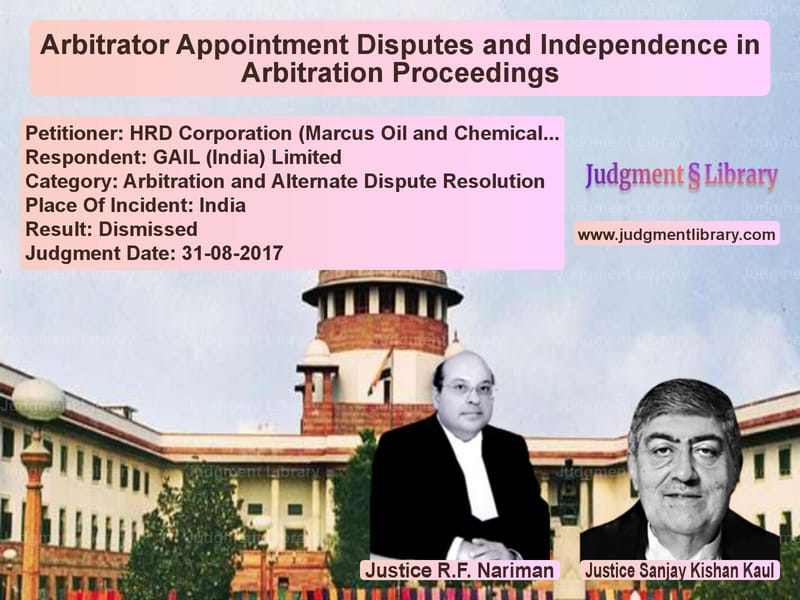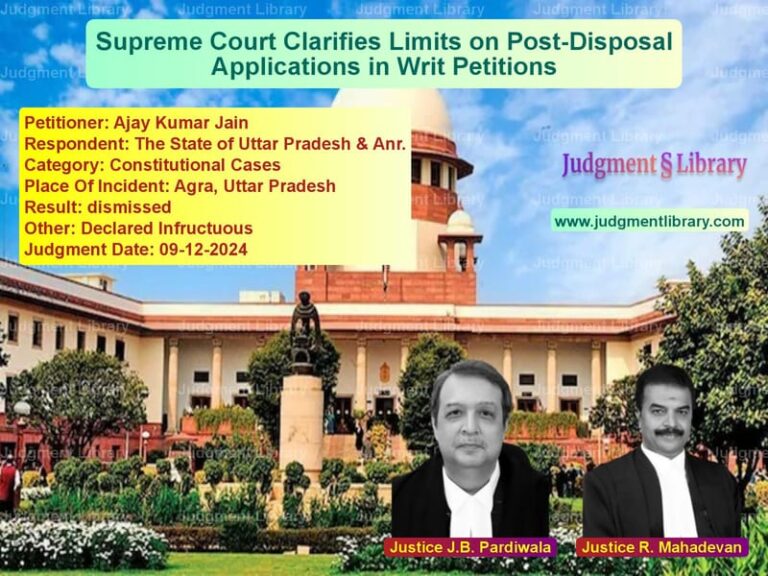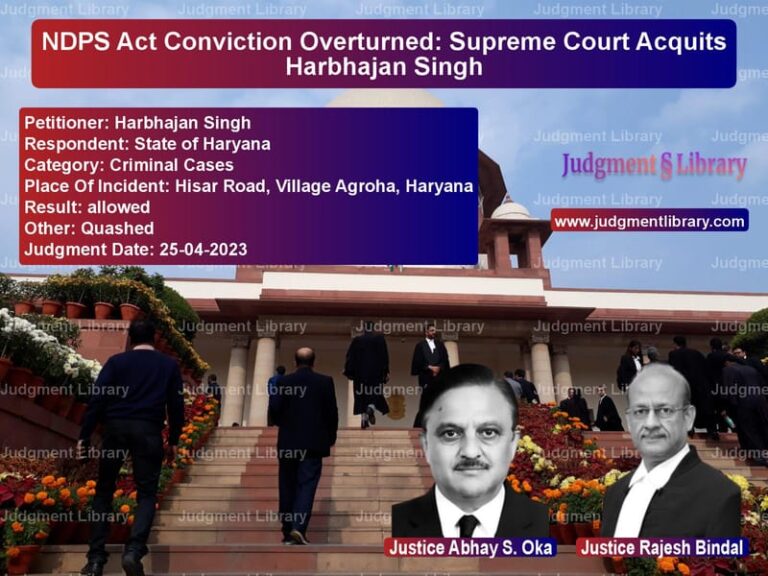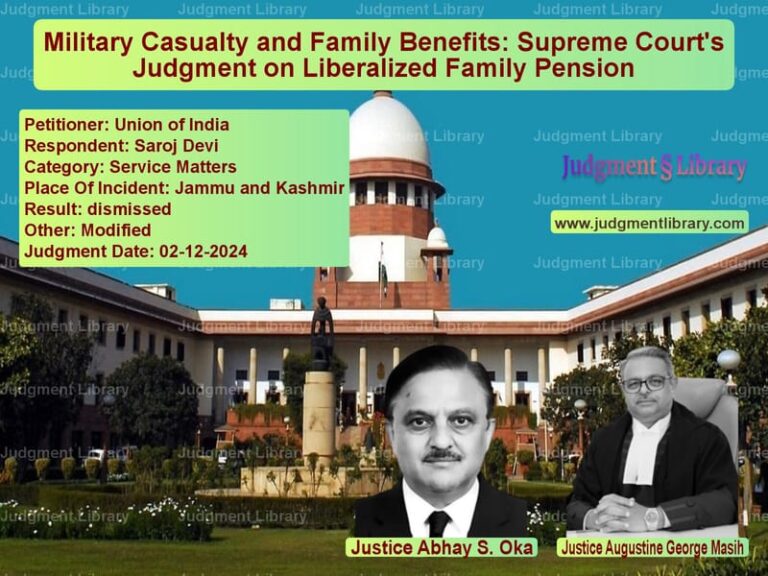Arbitrator Appointment Disputes and Independence in Arbitration Proceedings
The present case involves a dispute between HRD Corporation (Marcus Oil and Chemical Division) (the appellant) and GAIL (India) Limited (the respondent) regarding the appointment of arbitrators in an ongoing arbitration matter. The issue at hand is the challenge to the appointment of Justice Doabia and Justice Lahoti as arbitrators in the fourth arbitration between the parties, with particular focus on their independence and impartiality in light of the Arbitration and Conciliation (Amendment) Act, 2015.
Background: The dispute arose from a long-standing business relationship between the appellant and the respondent, centered around the supply of wax. The parties entered into an agreement in 1999, and over the years, several arbitrations have taken place to resolve disputes regarding the performance of the agreement. The current arbitration concerns issues arising from the 2016-2019 period.
The appellant initially nominated Justice K. Ramamoorthy as its arbitrator, but after his withdrawal, Justice Mukul Mudgal was appointed in his place. The respondent nominated Justice Doabia, and Justice K.K. Lahoti was later appointed as the presiding arbitrator. The appellant filed applications under Section 12 of the Arbitration and Conciliation Act seeking to terminate the mandates of both Justice Doabia and Justice Lahoti, arguing that their appointments were in violation of the provisions of the Act, particularly the provisions related to the independence and impartiality of the arbitrators.
Petitioner’s Argument: The appellant argued that both Justice Doabia and Justice Lahoti were ineligible to serve as arbitrators under the Seventh Schedule of the Arbitration and Conciliation Act. Specifically, the appellant contended that Justice Doabia had a prior involvement in the case, having been an arbitrator in an earlier dispute between the same parties, which created a conflict of interest under Item 16 of the Seventh Schedule. Furthermore, it was argued that Justice Lahoti’s previous advisory role to the respondent in an unrelated matter disqualified him under Item 1 of the Seventh Schedule, as it suggested a business relationship with the respondent.
Respondent’s Argument: The respondent, on the other hand, argued that neither Justice Doabia nor Justice Lahoti were disqualified from serving as arbitrators. The respondent referred to the IBA Guidelines on Conflicts of Interest in International Arbitration and asserted that the provisions of the Fifth and Seventh Schedules must be read in consonance with these guidelines. The respondent also argued that the disclosure made by Justice Lahoti regarding his advisory role in an unrelated matter was sufficient and did not violate the requirements of the Act. Additionally, the respondent claimed that the objections raised by the appellant were mere afterthoughts and lacked merit.
Court’s Ruling: The Supreme Court, in its judgment, examined the statutory scheme laid out in Sections 12 to 14 of the Arbitration and Conciliation Act, with particular reference to the provisions introduced by the 2016 Amendment Act. The Court emphasized the importance of maintaining the independence and impartiality of arbitrators, as required under the Act. The Court also considered the specific provisions of the Seventh Schedule, which lists the categories of individuals who are ineligible to serve as arbitrators due to potential conflicts of interest.
Key Points from the Judgment:
- The Court held that the amendments introduced in the 2016 Amendment Act, particularly Section 12(5), make it clear that if an arbitrator falls under any of the categories listed in the Seventh Schedule, they become ineligible to act as an arbitrator. The Court also noted that if an arbitrator is ineligible, they are de jure unable to perform their functions.
- Regarding Justice Doabia, the Court ruled that his prior involvement in a previous arbitration concerning the same parties and issues did not render him ineligible under Item 16 of the Seventh Schedule, as this item applies to prior involvement in the “same case” and not in a previous arbitration.
- The Court also examined the objections raised against Justice Lahoti’s appointment and concluded that the professional advisory opinion he had given to the respondent in an unrelated matter did not disqualify him under Item 1 of the Seventh Schedule. The Court held that the relationship between the arbitrator and the parties must involve a business relationship for Item 1 to apply, and a professional advisory role did not meet this criterion.
- Ultimately, the Court concluded that the objections raised by the appellant regarding the independence and impartiality of the arbitrators were without merit, and it upheld the decision of the single judge of the Delhi High Court dismissing the appellant’s petitions.
Conclusion: The judgment reinforces the importance of ensuring that arbitrators are independent and impartial, but it also clarifies the legal framework surrounding the appointment of arbitrators under the Arbitration and Conciliation Act. The Court emphasized that the provisions of the Act, particularly the Fifth and Seventh Schedules, must be interpreted in a manner that balances party autonomy with the need for impartiality in arbitration. The decision highlights the necessity of considering both the objective criteria laid out in the Act and the factual circumstances of each case when determining whether an arbitrator is eligible to serve.
Don’t miss out on the full details! Download the complete judgment in PDF format below and gain valuable insights instantly!
Download Judgment: HRD Corporation (Mar vs GAIL (India) Limited Supreme Court of India Judgment Dated 31-08-2017.pdf
Direct Downlaod Judgment: Direct downlaod this Judgment
See all petitions in Arbitration Awards
See all petitions in Dispute Resolution Mechanisms
See all petitions in Arbitration Act
See all petitions in Judgment by Rohinton Fali Nariman
See all petitions in Judgment by Sanjay Kishan Kaul
See all petitions in dismissed
See all petitions in supreme court of India judgments August 2017
See all petitions in 2017 judgments
See all posts in Arbitration and Alternate Dispute Resolution Category
See all allowed petitions in Arbitration and Alternate Dispute Resolution Category
See all Dismissed petitions in Arbitration and Alternate Dispute Resolution Category
See all partially allowed petitions in Arbitration and Alternate Dispute Resolution Category







